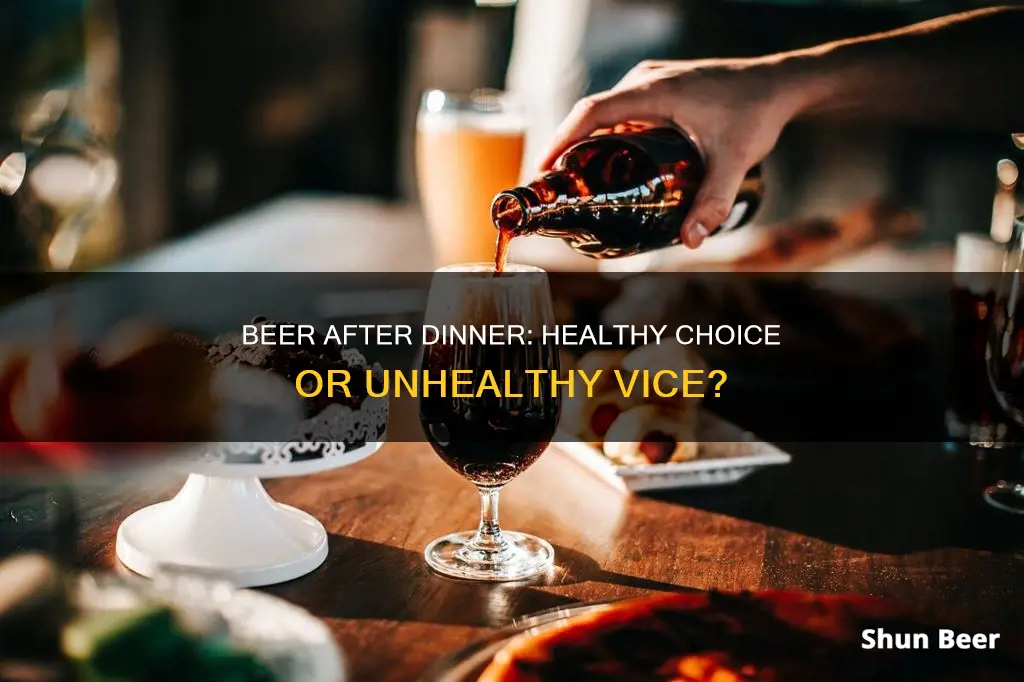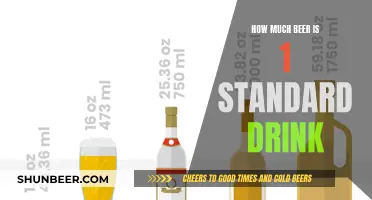
Drinking beer after dinner is a common way to unwind and relax, but there are some important things to consider when it comes to alcohol consumption. Firstly, drinking on an empty stomach can lead to faster absorption of alcohol into the bloodstream, resulting in more intense and faster effects. This is because, when there is no food in the stomach to slow it down, alcohol passes quickly to the small intestine, which has a larger surface area for absorption. This can lead to unpleasant side effects and health issues, such as hangovers, headaches, nausea, liver problems, inflammation, heart disease, and stroke. However, drinking after a meal lowers the chance of liver damage as the food acts as a protective barrier, slowing down alcohol absorption.
What You'll Learn

Beer tastes better with food
Beer lovers claim that beer tastes better with food, and this is true. The bitterness of beer is often an acquired taste, and food can help balance it out. A carb-packed meal, for instance, can perfectly complement your brew. Try munching on a bacon cheeseburger with your beer, and you'll be in for a pleasant surprise. Sweet and savoury flavours go well with bitter and tangy flavours.
When it comes to food and beer pairings, there are a few guidelines to consider. Firstly, contrast is key. Look for a dish with a strong, dominant flavour, such as sweet, rich, or oily, that can stand up to the beer's flavour. For example, oysters and stout make a good pairing, as the briny flavour of oysters can hold their own against the rich texture and chocolatey notes of the stout.
Another guideline is to complement the flavours. Match rich foods with heavy and flavourful beers, like stouts or porters. Pair light salads and fish with light beers, or wheat beers with fruit-based desserts. Beer can also serve as a palate cleanser, especially for dishes with bold or intense flavours, such as spicy foods or rich fried foods. A crisp and refreshing light beer can cut through the heat of a spicy dish, while fatty foods like French fries can help balance out the bitterness of an IPA.
It's also important to avoid overpowering flavours. Some medium and dark beers have robust flavours that can overwhelm certain types of food. For instance, pairing salmon with a pint of Guinness would result in the flavour of the beer completely covering the taste of the fish.
When pairing beer with food, it's all about finding the right balance and harmony between the flavours. Understanding the different styles of beer and their flavour profiles will help you create delicious and unique pairings that accentuate the flavours of both the food and the beer.
Drinking Beer While Taking Allegra: Is It Safe?
You may want to see also

Beer after dinner may boost energy or help prepare for sleep
Beer is an irresistible reward for many after a long week. But the question remains: should you drink beer before or after eating?
Drinking beer after dinner may boost your energy or help you prepare for sleep. Beer has the ability to give you a warm, fuzzy feeling, so you'll be ready to make the most of your night if it rouses you. On the other hand, if beer makes you drowsy, you can count on it to bring you straight to dreamland.
The effects of beer after dinner depend on several factors, including your body, metabolism, gender, and physical fitness. For example, if you have a sensitive stomach, it's best to avoid drinking beer on an empty stomach, especially if you're acidic. Additionally, if you're prone to nausea, it's best to avoid drinking beer after a large meal.
To enhance the positive effects of beer after dinner, it's recommended to wait at least an hour after your meal before pouring yourself a glass. This allows your food to settle and avoids interfering with the digestive process.
Remember, drinking in moderation and knowing your health status are crucial in deciding when to grab a beer. While beer can boost your energy or help you unwind, excessive consumption can lead to health issues and unpleasant side effects related to hangovers.
Beer and Keto: What You Need to Know
You may want to see also

Drinking on an empty stomach heightens the impact of alcohol
The stomach does absorb some alcohol, but at a slower rate compared to the small intestine. When the stomach is empty, alcohol passes through it quickly and reaches the small intestine, which has a larger surface area, allowing for quicker absorption into the bloodstream. This means that drinking on an empty stomach can lead to a faster rise in blood alcohol concentration and more pronounced effects.
The absence of food in the stomach also results in a faster overall absorption rate for alcohol. This can lead to dangerous spikes in blood alcohol levels, especially when consuming large amounts of alcohol in a short period. This can cause a range of immediate health effects and behavioural changes, including loss of coordination, reduced responsiveness, uncontrolled eye movements, and tachycardia (rapid heartbeat).
Drinking on a full stomach, on the other hand, can significantly alter the experience. Food acts as a protective barrier, slowing down the absorption of alcohol in the small intestine. By delaying the absorption process, food consumption effectively reduces the rapid rise of alcohol in the bloodstream. This means that if you have a meal before drinking, you can enjoy the moderate effects of your alcoholic beverages for a longer time.
In conclusion, drinking on an empty stomach can heighten the impact of alcohol by increasing the rate of absorption and leading to faster and more intense effects. It is important to consider the impact of food on alcohol absorption and to strike a balance between enjoying a meal and consuming alcoholic beverages to ensure a responsible and enjoyable drinking experience.
Beer Mail: Shipping Alcohol Straight to Your Doorstep
You may want to see also

Beer is less intoxicating than wine or vodka
Drinking alcohol on a full stomach is generally safer than drinking on an empty stomach, as food acts as a protective barrier, slowing down the absorption of alcohol in the small intestine. Beer, wine, and vodka all have different alcohol contents and rates of absorption, which affect how intoxicating they are.
The speed of absorption also depends on whether the stomach is empty or full. Drinking on an empty stomach allows alcohol to pass quickly from the bloodstream to the small intestine, resulting in faster intoxication. On the other hand, when the stomach is full, it is busy breaking down food, causing alcohol to remain in the stomach for a longer duration and delaying its entry into the small intestine. This slower absorption rate leads to a lower peak blood alcohol content and reduces the intoxicating effects.
While beer may be less intoxicating than wine or vodka, it is important to note that the intoxicating effects of any alcoholic beverage can vary depending on individual factors such as body mass index, metabolism, gender, and physical fitness. Additionally, drinking alcohol in moderation and ensuring proper hydration are crucial to minimize the negative effects of alcohol consumption.
Mixing Beer and Wine: A Night of Fun or Disaster?
You may want to see also

Drinking after a meal lowers the chance of liver damage
Drinking after a meal is a much safer option than drinking on an empty stomach. This is because food acts as a protective barrier, slowing down the absorption of alcohol in the small intestine. By delaying the absorption process, food consumption effectively mitigates the rapid rise of alcohol in the bloodstream. This is particularly important for your liver health.
The liver is the primary organ responsible for processing alcohol through your system. When you drink to excess, it puts a strain on this vital organ, which can cause inflammation and damaged cells. Even a single night of binge drinking can have a negative impact.
Liver damage from alcohol consumption happens in several stages. The first stage is a fatty liver, which is generally reversible and may not cause serious health problems. However, it can serve as a warning sign that you're drinking too much. If you continue to drink heavily, your liver can become inflamed, and you may experience significant health consequences. This condition is known as alcoholic hepatitis, which is more serious but may also be reversible. The final and most severe stage is cirrhosis, which is the buildup of scar tissue in your liver. This is irreversible and can lead to severe illness and even liver failure.
By drinking after a meal, you give your liver a better chance to process the alcohol effectively and reduce the risk of damage. It's important to note that drinking on an empty stomach can lead to faster intoxication and more unpleasant side effects, including a bad headache, nausea, liver problems, inflammation, heart disease, and stroke. Therefore, it's advisable to wait at least an hour after a meal before consuming alcohol, and it's always recommended to drink in moderation.
Minneapolis Park Beer Rules: What You Need to Know
You may want to see also
Frequently asked questions
Drinking after a meal lowers your chance of damaging your liver because your body absorbs the alcohol more slowly. However, alcoholic drinks can trigger increased stomach acid production, so drinking after a large meal can make you feel nauseous.
It's recommended to wait at least an hour after a meal before drinking beer. You might feel like your stomach is empty after 45 minutes, but it's better to wait longer. Some people even opt for a 3-4 hour break.
Drinking on an empty stomach can lead to health issues and more unpleasant side effects related to a hangover. These can include a bad headache, nausea, liver problems, inflammation, heart disease, and stroke.
Drinking after a large meal can make you feel sick. Beer lovers also claim that beer doesn't taste as good without food, as the right food can balance out the bitter flavour.







